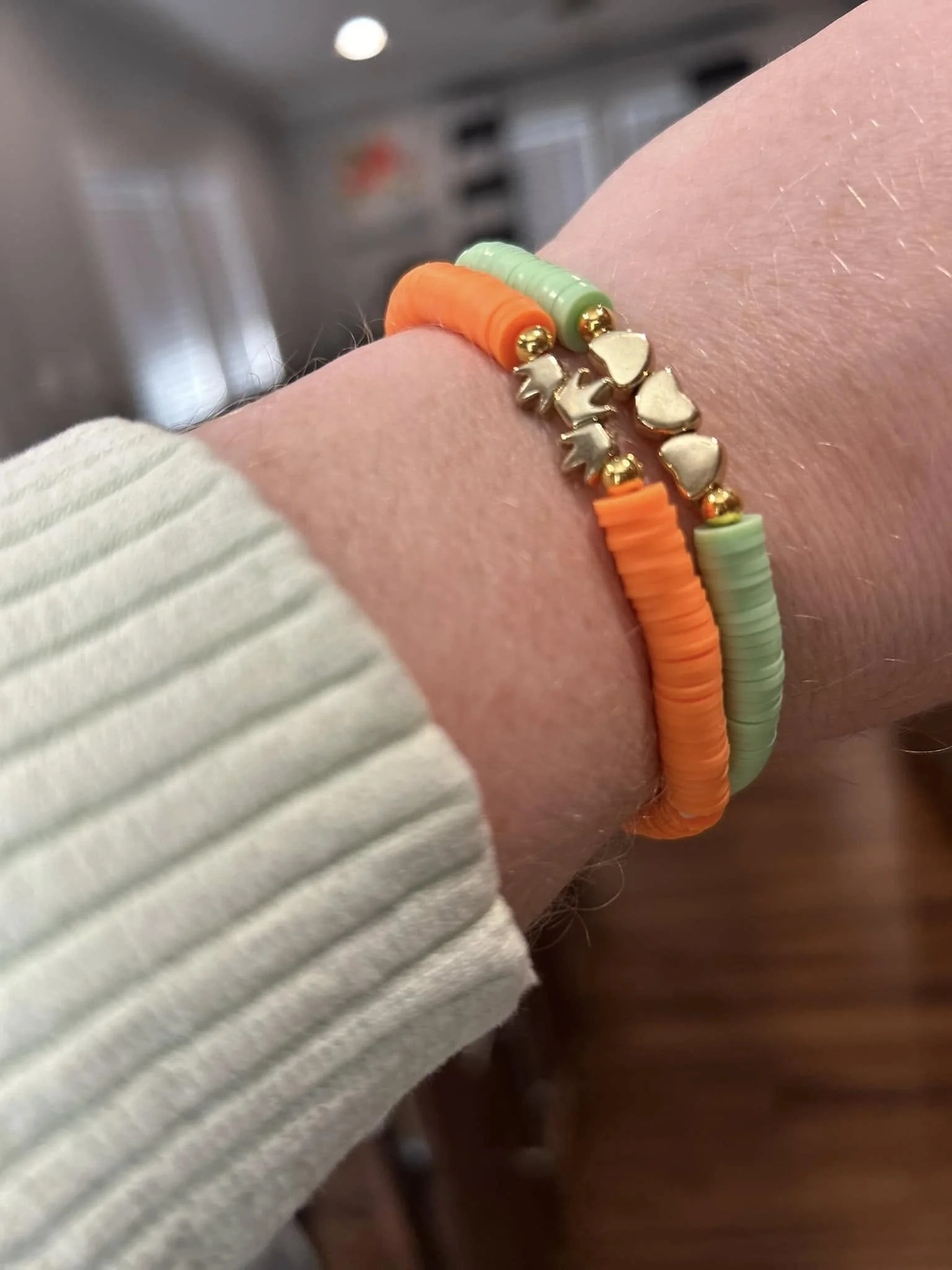The Life of a ShowChristian
This blog post is a continuation of what was just supposed to be a brief social media thought:
“I did something today 20 year old me would never have dreamed or approved of: I took my daughter on a #lifeofashowgirl release day date.
Buy the vinyl at our local record shop
Homemade carrot cake with teal frosting and orange sprinkles
Matching friendship bracelets
Showing of Life of a Showgirl at the movie theatre
And ya know what? We had fun…together.
Celebrities are just people. Musicians, authors, athletes, artists, pastors or politicians…humans can make anyone an idol. Often these celebrities are coming from a place of courage, creativity, boldness or strength that yeah…we wish we could emulate. They embody a message we feel should be shared. They carry a story we connect with or maybe have overcome a challenge that gives us hope.
Getting in on the #tloas hype today wasn’t to celebrate a person. It was to make a connection with my daughter. It was to open dialogue, make a memory, play a little and for a few hours just ignore the seriousness of the world.
I’ve already seen what the life of a show-Christian looks like. And I’m not here for that anymore. That’s not real life nor is it real Christianity. The glitz, glamor and gallantry of a contemporary church platform is not a stage I feel Jesus would grace.
Faith shouldn’t leave you empty and used, bloodied and bullied, having to perform and be perfect.
So as our Life of a Showgirl, teal-and-orange day comes to a close, the important conversations between mom and kiddo have ended, and that carrot cake flavor still lingers, I settle in to reflect.”
And after that good ‘ole, deeper reflecting I wrote the following, which you can now read if you have a few minutes:
I used to be really good at it. The smile…that plastered on “Ministry Smile.” The testimony. The “God is good” on cue. I knew how to play the part. Not because I was fake—but because I was molded by a system that taught me performance was protection and proper form.
This is the life of a ShowChristian. It’s not always narcissism. Sometimes it’s survival. Sometimes it’s what we were groomed to believe was holy.
Christianity, But Make It Stage-Ready
Modern church culture doesn’t really ask you to be whole, authentic or human. It asks you to be convincing.
Say the right things. Look the part. Keep your doubts quiet. Your sins secret. Your real face only seen at home. And keep your trauma off the mic, unless you have a powerhouse “transformation story” that will bring in an audience.
It’s not about being faithful to what you say you believe—it’s about being seen as faithful. And if you’re good at the show, you get the stage.
What Is a ShowChristian?
A ShowChristian is someone who’s learned to perform faith for approval, belonging, or power. Sometimes it’s strategic—used to gain influence, hide abuse, or maintain control.
Other times, it’s a trauma, survival or learned response. We were taught to smile through private pain, quote verses to silence doubt, “do life” with the other people within our church culture, call it all “obedience” and never stray from the “truth” we have been spoon fed.
But performance isn’t the same as sacred becoming. And pretending isn’t the same as healing or wholeness. You can look holy and still not be whole.
Red Flags of Showmanship Christianity
Church as a social club: Faith becomes networking. Belonging depends on who you know, not who you are.
Sunday-only spirituality: Worship is loud and curated for applause, but love and integrity are missing on Monday.
Platform over people: Leaders are protected. Survivors are silenced.
Image management: Vulnerability is punished. Struggle is hidden.
Spiritualized control: Scripture is used to shame, silence, and suppress.
Charisma over character: Loud, polished voices get the mic. Accountability or genuineness gets ignored.
Selective morality: Wrongdoing is condemned when it’s inconvenient—but excused when it protects power.
Churchy language, hidden harm: “We’re just praying through it” or “forgive like Jesus” becomes a cover for abuse.
Fear of the outside world: Curiosity is condemned. Critical thinking is called rebellion.
Method over mercy: If it’s tradition we keep doing it—even when it’s harming people.
Struggle is hidden or ignored: Mental health is spiritualized or dismissed. Abuse is played down or covered up.
When Faith Triggers the Nervous System
High-control faith spaces often use emotional intensity—music, lighting, urgent altar calls—to override your body’s signals. It feels spiritual, but it’s often dysregulating.
You might feel:
Disconnected from your body
Overwhelmed by false urgency
Triggered by familiar phrases or settings
If your body says “this isn’t safe,” listen. God doesn’t bypass consent. Healthy faith honors your nervous system.
Emotions can be swayed by a planned “worship experience,” it doesn’t necessarily mean it’s God moving. It might just be your nervous system talking to you.
The Difference Between Sincerity and Showmanship
Let me be clear: Not everyone who looks polished is insincere. Some are doing their best in systems that reward performance. Some are deeply sincere—but deeply shaped by toxic expectations.
The difference is this: Sincerity makes space for imperfection. Showmanship demands the illusion of perfection.
Sincerity says, “I’m still learning.” Showmanship says, “I already have the answer.”
Sincerity allows grief, doubt, and nuance. Showmanship silences anything that threatens the brand.
Deconstruction: Walking Off the Stage
Faith deconstruction isn’t rebellion. It’s the brave act of stepping off the stage and asking, “Is this real?” It’s how we move from performance to presence. From method to meaning. From fear to balance.
Deconstruction is what happens when the lights are too bright, the script no longer fits, and your soul starts whispering, “There has to be something different,” or, “Something just isn’t right.”
It’s not destruction. It’s reconstructing people and systems—with truth, autonomy, and emotional safety at the center.
You’re Allowed to Exit the Theater
You don’t have to keep performing. You don’t have to keep pretending. You don’t have to call harm “holy.”
You’re allowed to walk off the stage. You’re allowed to be real. You’re allowed to be free.
What Real Faith Looks Like
You’re allowed to be messy.
You’re allowed to ask hard questions.
You’re allowed to change your mind.
You’re allowed to walk away—and still be loved.
You don’t have to prove your faith to anyone. Not with your wardrobe. Not with your silence. Not with your ability to endure harm and call it purification. Not with how many Bible verses you can quote or prayers you’ve prayed outloud.
Walking away from The Life of a ShowChristian isn’t about losing faith—it’s about finding what is real. This isn’t rebellion. It’s a return. To balance. To personal integrity. To a pureness of heart that doesn’t need a stage.
If you’ve been living The Life of a ShowChristian, and you’re tired of the performance: I see you. You’re not broken.
Is it time to leave the stage to find what’s sacred?
10 Questions for Personal Reflection:
When did I first learn that being “good” meant being seen a certain way?
What parts of my faith expression feel rehearsed or expected?
Have I ever felt punished or rejected for being honest in a faith space?
What spiritual environments feel emotionally overwhelming or dysregulating to me now?
How does my body respond when I hear religious language or worship music?
Am I allowed to be imperfect in my current faith community?
What’s the difference between being sincere and being performative in my spiritual life?
Who benefits when I perform faith instead of live it?
Have I ever seen spiritual abuse hidden behind “doing things the right way”?
What truths have I been afraid to name because they disrupt the performance?
P.S. There’s nothing wrong with being a performer. Artistry is beautiful. Storytelling is sacred. We are creative beings. Please, enjoy your local theatre, your kid’s recital, your open mic night.
But when the stage, the bright lights, and the pursuit of fame are used to twist Christianity or faith into something it was never meant to be that’s when it becomes harmful.
Faith was never meant to be a show. It was meant to be humbly lived.





